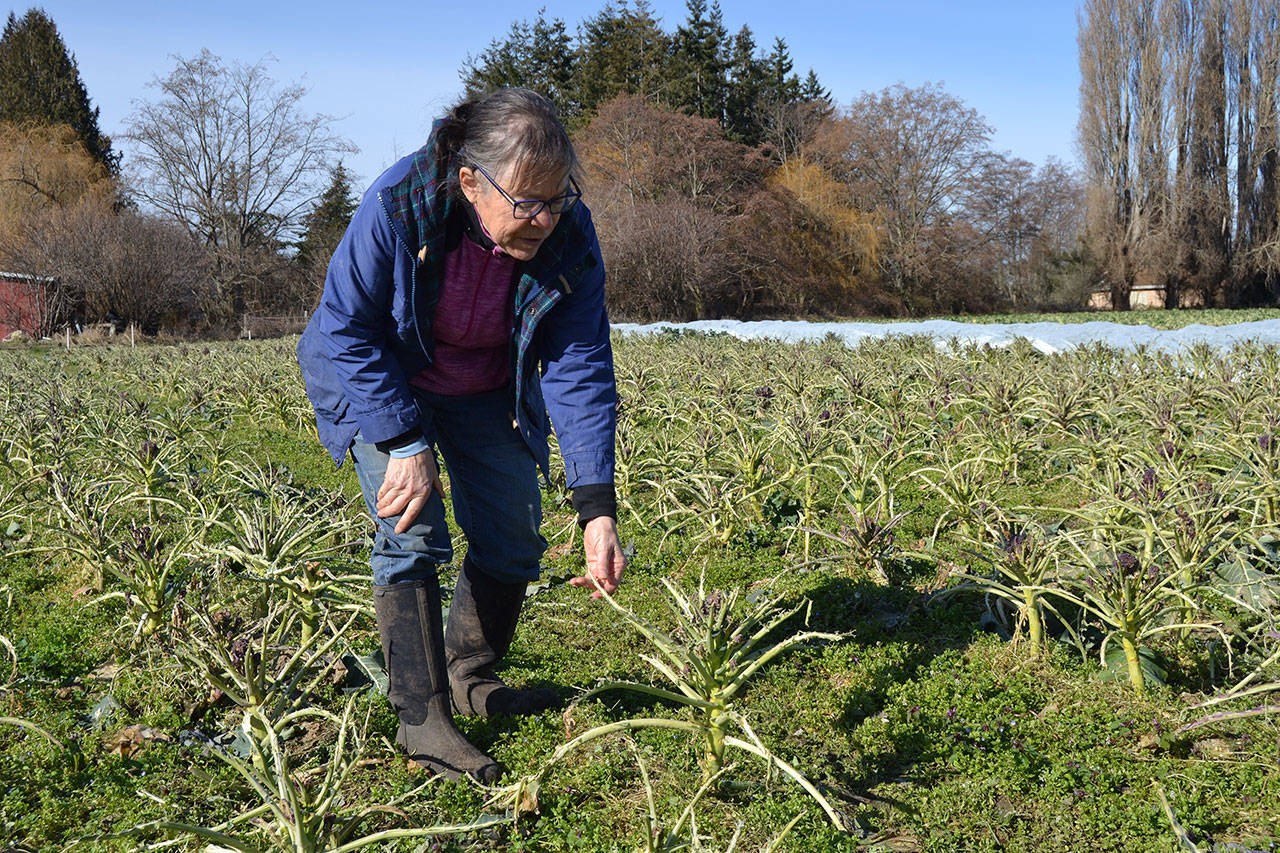As if the damage from recent snowfall wasn’t enough for local farmers — and their crops — to endure, some hungry birds made a big impact on farmland at Nash’s Organic Produce in Dungeness.
Patty McManus-Huber, promotions coordinator for the farm, said 10 acres of purple sprouting broccoli (PSB), and Italian cauliflower were eaten in full by various migrating birds, including trumpeter swans.
“They consumed all the leaves,” McManus-Huber said.
“In the six or seven years we’ve grown PSB they’ve never touched it. We did really with PSB last year and we were looking forward to this year. It really helps us get through spring — our hardest time of year.”
Snow began to rigorously fall on Feb. 8 in the Sequim-Dungeness area. McManus-Huber said vegetable production manager Mike Castle checked the crops in the Wilson Field, southeast of the farm store on Tuesday, Feb. 12, to discover them full covered in about 15 inches of snow.
When staff checked again on Friday, Feb. 15, the broccoli and cauliflower’s leaves had been mostly eaten over the two-day span.
McManus-Huber said that as the snow began to melt, she believes the purple tops of the broccoli poked through the snow and was one of the few food sources available with so much snow covering grasslands.
She said snow can protect plants like broccoli from freezing and acts as insulation.
“We believed we would have been fine with the snow,” McManus-Huber said.
However, with their main spring crop gone, farm owner Nash Huber and his staff will likely focus on their farm fresh eggs, pork and grains, McManus-Huber said.
“We’ll do our best to come up with some alternative spring crops,” she said. “We may have some vegetables as the season progresses.”
Cutting carrots short
In the last two years, Nash’s staff harvested and froze carrots around mid-November, to prevent swans from eating them.
“We prefer to keep them in the ground because they get sweeter as they stay in the ground,” McManus-Huber said. “The swans will rip them out of the ground and eat them. By freezing them we lose a lot, but not everything.”
As reported in January 2018 by the Sequim Gazette, leaders with the Olympic Peninsula Audubon Society say swans have increased in recent years.
Bob Boekelheide of the Olympic Peninsula Audubon Society said Sequim sees swans arrive in early November and peak around January-February.
In an Audubon Society member’s last informal count, about 200 trumpeter swans were spotted near Schmuck Road and Port Williams Road area in the last week.
Despite their impact on local crops, McManus-Huber said, “We don’t blame the birds.”
In Nash’s Organic Produce’s newsletter, she wrote, “These birds only do what they do to survive, and we, like most people, think they are beautiful and deserve to be here. As we understand it, they are also protected. It’s just a difficult pill for any farmer to swallow.”
Previously, McManus-Huber said residential developments in the Sequim-Dungeness area over the years encouraged birds toward open space — which happens to be farmland.
Hunting the birds and chasing and/or injuring birds is illegal, according to state law. Huber’s staff have considered deterrents in the business’ hundreds of acres of farmland but the cost would be too high, McManus-Huber said.
Lost time
Along with the financial aspect of lost crops, Huber lost years of work conditioning his broccoli and cauliflower for the northwest climate.
Huber has been breeding PSB to become disease- and cold-resistant, and his Italian cauliflower has been a work in progress for more than 12 years, too.
He and McManus-Huber visited Turin, Italy in 2006 and received some Mediterranean cauliflower seeds he’s been working to make work locally.
“We will plant it again, but we lost a couple of years work there,” McManus-Huber said.
For now, Nash’s staffers plan to leave the 10 acres alone and await word from its insurance company, the Washington State University Extension and the Washington State of Fish and Wildlife on options to recoup costs.
If losses can’t be partly or fully recouped, McManus-Huber said they may have to consider scaling back whether that’s in staffing and/or products.
Staff are also concerned for 2020’s winter.
“One of our concerns is that, after such a great culinary experience, these migrating birds will return to feed in our fields again next year,” McManus-Huber wrote in the newsletter.
Nash’s Organic Produce, 4681 Sequim-Dungeness Way, Sequim, can be found online at nashsorganicproduce.com. Reach its Farm Store at 360-683-4642 and the farm at 360-681-7458.
To learn more about the Olympic Peninsula Audubon Society, visit http://olympicpeninsulaaudubon.org.
Editor’s note: Reporter Matthew Nash has no affiliation with Nash’s Organic Produce.
Reach Matthew Nash at mnash@sequimgazette.com.



